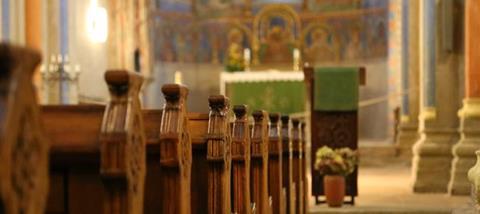
I don’t know if Mark Twain ever actually said "reports of my death have been greatly exaggerated". But it’s a good line, and it’s a fitting response to the latest survey of the UK Church claiming that more than half of the population are now non-religious.
This news is not as troubling as it might appear (and it isn’t news). At best it’s a partial view.
This survey is specifically about "religious affiliation". People no longer associate with an organised denomination such as the CofE. But that says nothing about people’s beliefs except that they are now being honest and open. In the past any decent, law abiding citizen would likely answer "CofE" to anyone who asked them for their religion. Today it is acceptable, even normal, to say "none".
This isn’t news
We all know this. It’s been the trend since at least the 1950s. Before that we had what we called "Christendom", when pretty much everyone went to church, (and you could even have your wages docked if you didn’t). The social norm was to show up on Sunday. People became Christians by inertia. You were born into it. Although some may hearken back to the good old days when the pews were full, there was huge nominalism, far more than today.
At the same time there are surveys that seem to disagree with this survey. Research shows that two-thirds of those who don’t attend church still have a strong personal faith. And in a recent survey 21% of young people described themselves as active Christians - much higher than previous estimates.
Given this survey after survey, you could be forgiven for asking…
What’s going on?
Three factors are in play. Taking any one on its own gets you a sensational headline but not the full picture.
1. First, yes there is a decline in organised religious attendance
The Church is shedding nominal attenders as discussed, and, significantly, there is less empathy with those who do attend church. People today dismiss the exclusive claim that there can be just one true way. Postmodern thinking is most comfortable with the idea of many competing truths. At the same time 9/11 and the rise of militant forms of religion has fuelled people’s fears that exclusive religious claims seem to lead to violence. You and I might not be perpetrators of this violence but when we make exclusive claims to our colleagues and neighbours, we are tarred with the same brush.
2. Many less formal churches on the margins are seeing growth
Many churches, especially new church traditions, are alive and well and growing. Generally, these are off the radar when people do counts of Sunday church attendance. Midweek congregations are growing as we face busier lifestyles. Black and minority ethnic churches are growing. Fresh expressions of church are growing, such as messy church. Interestingly Cathedral congregations are growing as there is a resurgent interest in the ancient.
Church is changing in many cases to better suit a society unused to a 90 minute stint on Sunday morning. Added to this when we consider the developing world we again see almost meteoric growth of churches, most recently in countries such as Iran and Afghanistan
But the most important point is the final one.
3. There are a huge number of people who are 'Spiritual But Not Religious' (SBNR)
People are saying 'No thanks' to organised religion. They are saying 'No thanks' to what they perceive the Church to be. But they are not saying 'No' to God.
Latent spirituality, or what some refer to as 'believing without belonging', is all around us.
For example the church where I am now saw a surprising number of people making use of a Prayer Tent on a community fun day, and similarly high interest in numbers attending a Healing Mission. In both cases people came in who would not voluntarily enter a church, but they were swayed by a tent in a field or something that said 'healing' on it. It seems people are rejecting the dogma of organised religion, but are keenly interested in spirituality whether that means Eastern religion, mindfulness, some types of yoga or just 'something ancient'.
What do we do with SBNR people?
In explaining the tendency for people to look outside the church for spiritual experiences, theologian and writer Stuart Murray says it’s like people have become inoculated to authentic Christianity. People have received a tiny dose of church maybe as a child, or via the media, and that stops them getting the real thing. They think they have experienced Christianity and are now immune to the Gospel. And yet they remain open to the spiritual.
Ann Morisy explains that we need to step back and discuss the possibility of God before we try to share our Gospel. Our Christian witness must be viewed as meaningful, purposeful, a way of living well – it works! - before we start talking about a man on a cross. I think I would go further and say we need to stop answering questions that nobody’s asking. People’s questions are not usually about sin or the Bible. More often they are: Why aren’t all religions the same? Why does God allow suffering? We don’t necessarily have to know the right answer, but we do have to have thought it through so we can respond - without Christian jargon.
We need to ensure our witness is authentic. Do we have stories of what happened in our lives this year or even this month or this week that we can share with those who don't believe? Nobody can disprove your story. Use testimonial rather than dictatorial.
I will also make mention of Morisy’s idea of having symbols in our buildings that speak of 'something other', particularly for those of us in churches that are well used by community groups. Not a scripture verse – that won’t mean anything - something visual. Murals, symbols, candles, opportunities to request prayer, anything that implies 'you have not rented the room above the pub, this space is different'.
This country is not Christian and nor will it be again (let’s get over it)
And yet millions of people consider themselves to be on a spiritual journey. This is good news! When the church is on the margins like this it forces us to think in radical and agile ways – as the Church has done throughout history and throughout the world in times of significant growth. Sometimes there must be a pruning back for growth to emerge.
Are you ready to meet these SBNR’s where they are at? I sometimes wonder if the challenge to us as Christians is to ask ourselves the opposite question: might our churches have become 'Religious But Not Spiritual'? This is the perception of the wider population. This is why they discount church.



























